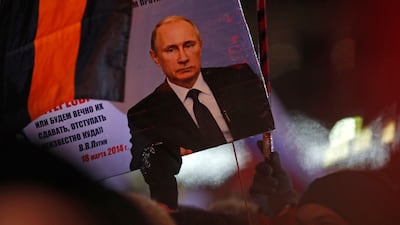This was the month that parts of the western world seemed to have gone back in time for all that the late physicist Stephen Hawking never did decisively pronounce on the likelihood of time travel. As in a Cold War-era spy novel, a retired Russian double agent was poisoned in a sleepy English town. There was a nerve agent, not a person but a lethal chemical weapon that's up to 10 times more potent than the VX that was reportedly used to kill the half-brother of the North Korean leader last year.
Britain furiously denounced Russia for the nerve agent attack on its soil with the foreign secretary calling Moscow a "malign and disruptive force". Russia hit back with scorn, hostility and apparent insouciance. Tit-for-tat diplomatic expulsions ensued, proportionally the largest from Britain since the 1970s. Meanwhile, British protests were taken up by France, Germany and the United States. And Nato promised to abide by its principle of collective defence, though how exactly was left unclear.
For those old enough to remember the Cold War, 2018 seemed to be running just as hot. So, is the West sliding into a state of perpetual conflict with Russia? If so, it would be an engagement without rules and the second time in 20 years that the western world has had to fight a war that doesn’t necessarily have uniformed armies, a code of conduct and only state actors.
Terrorism allied with a perverted version of religious belief has been this century’s first unconventional war. Its theatre extends far beyond the West, drawing in the Middle East, South Asia, South-east Asia and parts of Africa as well. There is little appetite in most countries in these regions for yet another protracted conflict especially without the ideological certainties of the Cold War era. The US is not what it used to be, the Soviet Union does not exist and China offers a very different, less polarising axis.
Everything points then to a future state of limited perpetual conflict with shifting western buy-in from time to time. By some accounts, the conflict has already been underway for a decade even though not properly recognised as such. Russian-born US military historian Max Boot says the war began in 2008 with the Russian invasion of pro-western, Nato-leaning Georgia. This was followed by Russia's 2014 move into Ukraine to annex Crimea, and then its game-changing 2015 entry into the Syrian conflict.
But there is more. In the years since 2015, Russia has become a mythical bogeyman. Every western ballot box result is said to have been either influenced by, or somehow heroically protected from Russia. Every political ruction is dusted for Russian fingerprints. Is Russia really so powerful a force now that it can act with an impunity impossible even in Cold War days?
No. There is manifest disparity with its adversaries and one of the main players in the conflict has changed. The Soviet Union is no more. In its place stands the vastly weaker Russian Federation. It is beset by the same worry that preoccupied the Soviet Union – survival – but is much more brittle. The successors to Soviet Cold Warriors feel less secure about both the present and the future. They are neither protecting a status quo in Europe nor entirely certain that the status quo at home can be preserved, for all that Russia’s president Vladimir Putin has just staged something even his own campaign team described as “incredible” – a landslide endorsement by voters for a fourth term in this week's election.
As Francis Richards, a veteran British diplomat who served in Moscow and headed the UK’s electronic intelligence-gathering Government Communications Headquarters, recently put it, “war is almost an obsolete word (in the current circumstances) ... the Cold War was propelled by entirely different motivations”. This means, he says, Russia today constantly seeks to “make a point”. This can take various forms, some proven, others merely alleged, and includes the use of a military-grade, Soviet-developed nerve agent; annexation of a sovereign neighbour’s territory; cyber-manipulation of western public opinion, or outright intervention in a faraway Middle Eastern civil war.
Indeed, in Russia today, there are few of the solid pleasing certainties that existed for Soviet leaders. Mr Putin, more than his Soviet predecessors, would cleave to the bittersweet note of the title of Leningrad-born US-based anthropology professor Alexei Yurchak's 2005 book, Everything Was Forever Until It Was No More, about a failing system that prompted mass self-delusion until the inevitable end.
Add to the sense of being harried by time Russia’s dismayed realisation in the early 2000s that it is not treated as equal to the West, and it becomes more possible to understand the swagger and dangerous swinges.
So too the context of a manageable asymmetric conflict. As long as the conflict lasts, so does Russia, at least as it is set up today.


